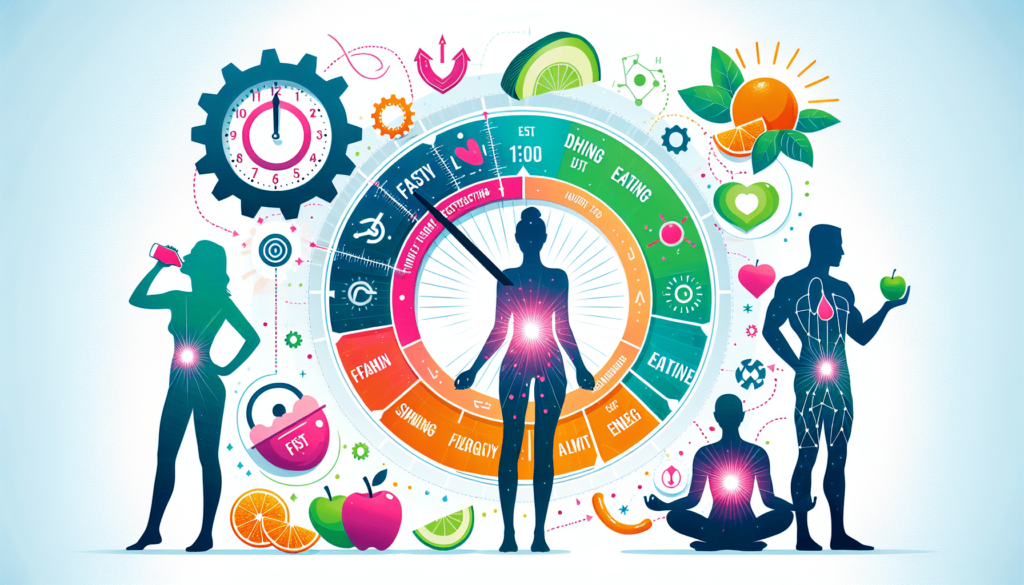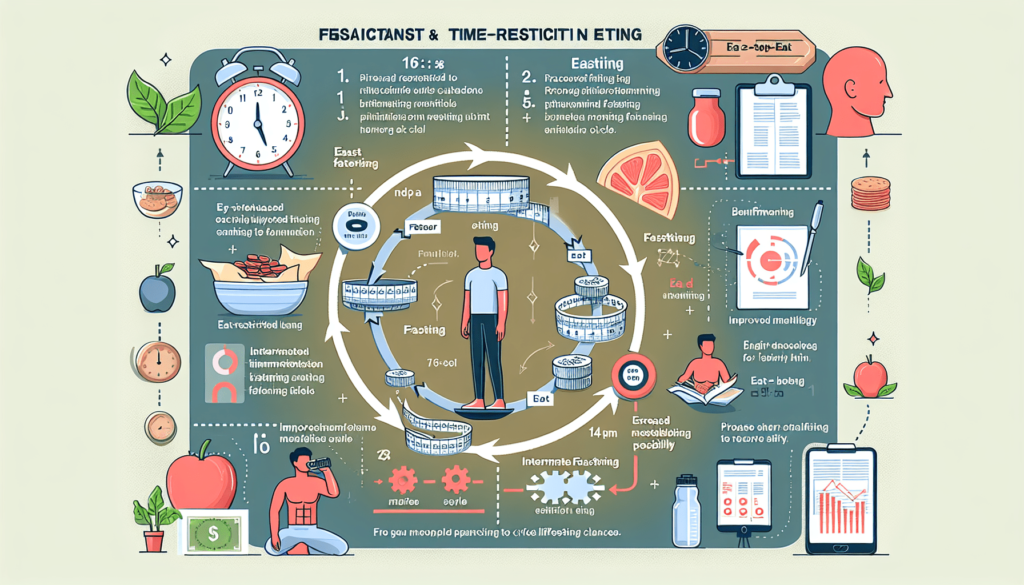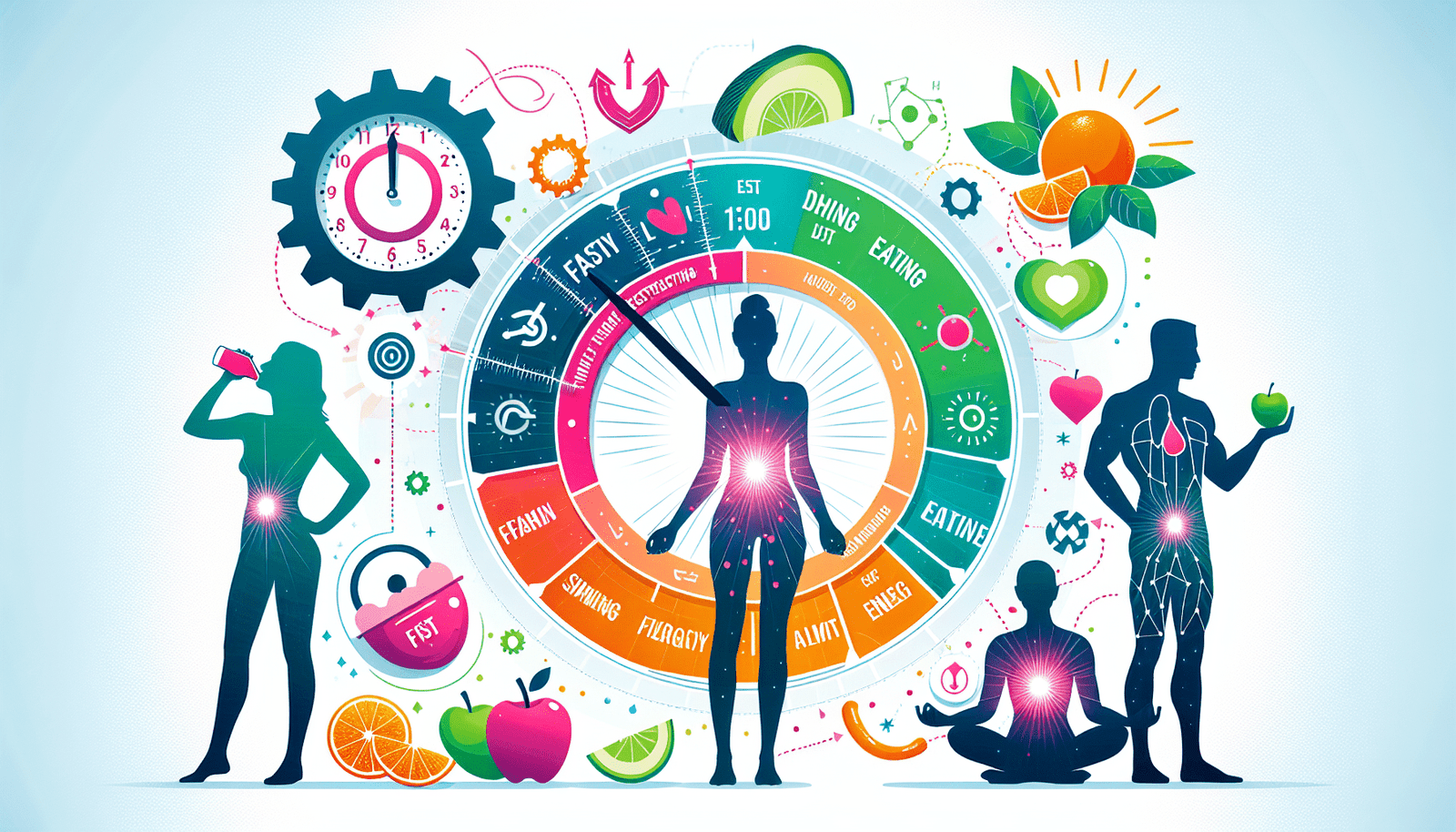In the world of healthy living, where food is considered medicine and prevention is key, there is a treasure trove of knowledge waiting to be unlocked. This article takes you on a journey into the power of nutrient-rich superfoods, delving into their disease-fighting potential and uncovering secrets to longevity. From the wonders of plant-based power to the myths surrounding dark chocolate and detox trends, we empower you to become an informed eater. By exploring the benefits of time-restricted eating and intermittent fasting, you can discover the keys to stress reduction, inflammation control, and mood-boosting nutrition. With actionable tips and delicious recipes, this article is your guide to a future brimming with vitality.
What is Intermittent Fasting?
Intermittent fasting, also known as time-restricted eating, is a dietary pattern that involves cycling between periods of fasting and eating. Rather than focusing on what you eat, intermittent fasting focuses on when you eat. It has gained popularity in recent years due to its potential health benefits, including weight loss, improved body composition, reduced inflammation, and enhanced heart health.
Definition and Overview
Intermittent fasting is not a diet in the traditional sense. It is a pattern of eating that involves alternating between periods of fasting and eating. During the fasting periods, typically ranging from 12 to 24 hours, no calorie intake is allowed, although water, black coffee, and tea are generally permitted. The eating periods, also known as eating windows, are where all calorie intake is concentrated for the day.
Different Methods of Intermittent Fasting
There are several different methods of intermittent fasting, each with its own unique fasting and eating window lengths. Some popular methods include:
- 16/8 method: This method involves fasting for 16 hours and restricting eating to an 8-hour window.
- 5:2 diet: With this method, you eat normally for 5 days of the week and restrict calorie intake to 500-600 calories for 2 non-consecutive days.
- Alternate-day fasting: This method involves fasting every other day, with some variants allowing a limited calorie intake on fasting days.
- 24-hour fasting: This method involves fasting for a full 24 hours, typically done once or twice a week.
How Does Intermittent Fasting Work?
Intermittent fasting works by producing a variety of physiological effects in the body. These effects can lead to numerous health benefits, including improved insulin sensitivity, hormonal balance, cellular and genetic changes, and metabolic benefits.
Effects on Insulin Levels
Insulin, a hormone produced by the pancreas, plays a crucial role in regulating blood sugar levels. Intermittent fasting can improve insulin sensitivity, helping to lower blood sugar levels and reduce the risk of developing insulin resistance. By restricting calorie intake during fasting periods, the body becomes more efficient at using insulin, leading to better blood sugar control.
Impact on Hormones
Intermittent fasting has been shown to have positive effects on various hormones in the body. Fasting triggers an increase in human growth hormone (HGH) levels, which can aid in muscle growth and fat loss. Additionally, intermittent fasting may help regulate other hormones involved in appetite control, such as ghrelin and leptin, potentially leading to reduced hunger and improved weight management.
Cellular and Genetic Changes
Intermittent fasting can induce cellular and genetic changes that may have positive implications for overall health. During fasting periods, cellular repair processes are activated, including autophagy, which is the body’s way of breaking down and recycling damaged cells. Fasting also stimulates the production of certain genes that are involved in longevity and disease prevention.
Metabolic Benefits
Intermittent fasting can lead to metabolic benefits, including increased fat burning and improved metabolic flexibility. When the body enters a fasting state, it depletes its glycogen stores and starts utilizing stored fat as an energy source. This can lead to weight loss and improved body composition. Additionally, intermittent fasting may help regulate metabolic hormones, such as insulin and adiponectin, further supporting metabolic health.

Benefits of Intermittent Fasting
Intermittent fasting has been associated with a wide range of health benefits. Let’s explore some of the key benefits of incorporating intermittent fasting into your lifestyle.
Weight Loss and Improved Body Composition
One of the primary reasons people turn to intermittent fasting is for weight loss and improved body composition. By restricting calorie intake during fasting periods, the body is forced to tap into stored fat for energy, leading to weight loss. Additionally, intermittent fasting has been shown to help preserve muscle mass, allowing for a more favorable body composition.
Reduced Inflammation
Chronic inflammation has been linked to numerous health problems, including heart disease, diabetes, and certain types of cancer. Intermittent fasting has been shown to reduce markers of inflammation in the body, potentially lowering the risk of developing these chronic diseases. By providing the body with regular periods of rest from constant digestion, intermittent fasting allows the immune system to better regulate inflammatory responses.
Enhanced Heart Health
Intermittent fasting may have beneficial effects on heart health. Studies have shown that intermittent fasting can improve markers of heart health, such as blood pressure, cholesterol levels, and triglyceride levels. By improving these risk factors, intermittent fasting may help reduce the risk of developing heart disease.
Improved Brain Function
Intermittent fasting has been shown to have positive effects on brain health and cognitive function. Studies in animals have demonstrated that intermittent fasting can increase the growth of new nerve cells in the brain, improve brain plasticity, and enhance memory and learning. While more research is needed in humans, these findings suggest that intermittent fasting may have neuroprotective effects and could potentially reduce the risk of age-related cognitive decline.
Reduced Risk of Chronic Diseases
Intermittent fasting has been associated with a reduced risk of developing chronic diseases such as type 2 diabetes, cancer, and Alzheimer’s disease. By improving insulin sensitivity, reducing inflammation, and promoting cellular repair, intermittent fasting can have a protective effect against these diseases. However, it is important to note that more research is needed to fully understand the long-term effects of intermittent fasting on disease prevention.
Potential Anti-Aging Effects
Research suggests that intermittent fasting may have anti-aging effects on a cellular level. By promoting autophagy, a process that removes damaged cells and cellular debris, intermittent fasting may help slow down the aging process. Additionally, intermittent fasting has been shown to increase the production of certain longevity genes, potentially extending lifespan.
Getting Started with Intermittent Fasting
If you are interested in trying intermittent fasting, here are some tips to help you get started:
Choosing the Right Method for You
There are various methods of intermittent fasting, and it’s important to choose the one that suits your lifestyle and preferences. Consider factors such as your daily schedule, eating habits, and personal goals when selecting a fasting pattern. Experimentation may be necessary to find the method that works best for you.
Setting a Fasting and Eating Window
Once you have chosen a fasting method, establish a fasting window and an eating window. Determine the number of hours you will fast each day and when you will consume your meals during the eating window. Consistency is key, so try to stick to the same schedule every day.
Handling Hunger and Cravings
During the fasting periods, it is normal to experience hunger and cravings, especially in the beginning. Stay hydrated by drinking water, black coffee, or tea, as this can help suppress appetite. Engaging in activities that keep your mind occupied, such as going for a walk or practicing a hobby, can also distract you from food cravings.
Staying Hydrated During Fasting Periods
It is crucial to stay hydrated during fasting periods to support overall health and prevent dehydration. Make sure to drink an adequate amount of water throughout the day. You can also incorporate herbal teas or sparkling water to add variety to your hydration routine.

Tips for Successful Intermittent Fasting
To make the most of your intermittent fasting journey, consider these tips for success:
Gradual Approach and Adaptation
Instead of diving straight into an intense fasting schedule, consider starting with a more gradual approach. Begin by gradually extending your fasting window and reducing your eating window over time. This will allow your body to adapt to the fasting cycles more comfortably.
Proper Nutrition During Eating Windows
While intermittent fasting primarily focuses on when you eat, it is still important to prioritize nutrient-dense, whole foods during your eating windows. Ensure that you are meeting your daily calorie and macronutrient needs to support energy levels, muscle growth, and overall health.
Managing Exercise and Physical Activity
Exercise can be incorporated into an intermittent fasting routine, but it is important to listen to your body and adjust accordingly. Some individuals may prefer to exercise during their eating windows to ensure they have sufficient energy for physical activity. Experiment with different exercise timings to find what works best for you.
Importance of Sleep and Stress Management
Prioritizing sleep and managing stress are crucial for overall health and well-being, especially when practicing intermittent fasting. Aim for 7-9 hours of quality sleep each night and incorporate stress management techniques such as meditation or yoga into your daily routine. These practices can help support hormone balance and maximize the benefits of intermittent fasting.
Common Mistakes to Avoid
To ensure you have a successful intermittent fasting experience, be aware of these common mistakes and take steps to avoid them:
Overeating in Eating Windows
It can be tempting to consume excessive calories during the eating windows, especially if you have been fasting for an extended period of time. However, overeating can hinder your progress and lead to weight gain. Listen to your body’s hunger and fullness cues and practice mindful eating to avoid overeating.
Not Listening to Your Body
Each individual is unique, and what works for one person may not work for another. Pay attention to your body’s signals and adjust your fasting schedule or eating patterns accordingly. If you experience negative side effects or extreme hunger, it may be necessary to modify your approach to intermittent fasting.
Lack of Consistency
Consistency is key when it comes to intermittent fasting. Stick to your chosen fasting and eating windows as closely as possible to achieve the desired results. Consistency helps your body adjust to the fasting routine and allows for a more balanced approach to eating and fasting.
Ignoring Nutritional Quality
While intermittent fasting can be flexible in terms of what you eat, it is still important to prioritize nutritional quality. Focus on consuming nutrient-dense foods during your eating windows to support overall health and well-being. Include a variety of fruits, vegetables, lean proteins, healthy fats, and whole grains to ensure you are meeting your nutritional needs.
Intermittent Fasting and Special Populations
Intermittent fasting may not be suitable for everyone, including certain special populations. Here are some considerations for specific groups:
Pregnancy and Breastfeeding
During pregnancy and breastfeeding, it is important to provide your body with adequate nutrients for both your own health and the development of your baby. Intermittent fasting is generally not recommended during this time, as it may not provide sufficient nutrition for these critical stages.
Children and Adolescents
Children and adolescents have specific nutritional needs to support growth and development. Intermittent fasting is not recommended for this age group, as it may interfere with proper nutrition and potentially disrupt normal growth patterns.
Elderly Individuals
Elderly individuals may have different nutritional needs and considerations. It is important to consult with a healthcare professional before starting intermittent fasting, especially if you have any underlying health conditions or take medication that may affect fasting.
Athletes and Active Individuals
Athletes and active individuals have increased energy and nutrient requirements due to their higher levels of physical activity. Intermittent fasting may need to be carefully tailored to meet these increased needs and prevent nutrient deficiencies. Working with a registered dietitian or sports nutritionist can help ensure the appropriate balance between fasting and fueling for optimal athletic performance.
Potential Side Effects and Risks
While intermittent fasting can be safe and beneficial for many individuals, there are potential side effects and risks to be aware of:
Extreme Hunger and Binge Eating
During fasting periods, it is normal to experience some level of hunger. However, if the hunger becomes extreme and leads to binge eating behaviors, it may be a sign that intermittent fasting is not suitable for you. Pay attention to your hunger cues and make sure to consume enough calories during your eating windows to prevent excessive hunger.
Disordered Eating Patterns
Intermittent fasting may not be appropriate for individuals with a history of disordered eating or an unhealthy relationship with food. The strict fasting periods and potential restriction of calorie intake can trigger or exacerbate disordered eating behaviors. It is important to prioritize your mental and emotional well-being when considering intermittent fasting.
Hormonal Imbalances
While intermittent fasting can have positive effects on hormone regulation, it can also potentially disrupt hormonal balance in some individuals. Women, in particular, may experience changes in menstrual cycles or the onset of hormonal imbalances with certain fasting patterns. If you notice any irregularities or concerns, it is recommended to consult with a healthcare professional.
Impact on Menstrual Cycle for Women
Intermittent fasting may have an impact on women’s menstrual cycles, especially if followed in a very strict or prolonged manner. Some women may experience irregular periods, changes in menstrual flow, or even temporary amenorrhea (absence of periods). If you experience these changes and are concerned, it is important to consult with a healthcare professional.
Combining Intermittent Fasting with Other Diets or Lifestyles
Intermittent fasting can be combined with other diets or lifestyles, such as the ketogenic diet, paleo diet, veganism, or vegetarianism. Here are some considerations for combining intermittent fasting with these dietary approaches:
Ketogenic Diet and Intermittent Fasting
The ketogenic diet, which is high in healthy fats, moderate in protein, and very low in carbohydrates, can be compatible with intermittent fasting. The combination of a ketogenic diet and intermittent fasting may enhance fat burning and ketone production, leading to increased weight loss and improved blood sugar control.
Paleo Diet and Intermittent Fasting
The paleo diet, which focuses on whole foods that were available to our ancestors, can also be combined with intermittent fasting. By practicing both the paleo diet and intermittent fasting, you can promote a whole-food, nutrient-dense diet while also reaping the metabolic benefits of time-restricted eating.
Vegan and Vegetarian Lifestyles with Intermittent Fasting
Intermittent fasting can be adapted to suit a vegan or vegetarian lifestyle. By ensuring a well-planned, balanced diet during the eating windows, individuals following a vegan or vegetarian diet can meet their nutritional needs while practicing intermittent fasting.
Conclusion and Final Thoughts
Intermittent fasting, or time-restricted eating, is an eating pattern that involves alternating between periods of fasting and eating. It has gained popularity for its potential health benefits, including weight loss, improved body composition, reduced inflammation, enhanced heart health, improved brain function, reduced risk of chronic diseases, and potential anti-aging effects.
Starting intermittent fasting involves choosing the right method for you, setting fasting and eating windows, and managing hunger and hydration. It is important to approach intermittent fasting gradually, prioritize nutritional quality, and listen to your body’s cues.
While intermittent fasting can be safe and effective for many individuals, it may not be suitable for everyone. Special populations, such as pregnant and breastfeeding women, children and adolescents, elderly individuals, and athletes, should consult with a healthcare professional before starting intermittent fasting.
Incorporating intermittent fasting with other diets or lifestyles, such as the ketogenic diet, paleo diet, veganism, or vegetarianism, is possible but requires careful planning and consideration of nutritional needs.
Overall, intermittent fasting can be a powerful tool for improving health and well-being. By unlocking the benefits of time-restricted eating, you can unlock a future brimming with vitality and enjoy the journey of exploring the world of healthy foods and disease prevention.

